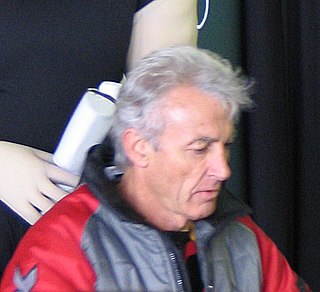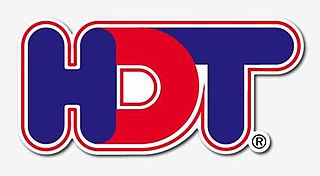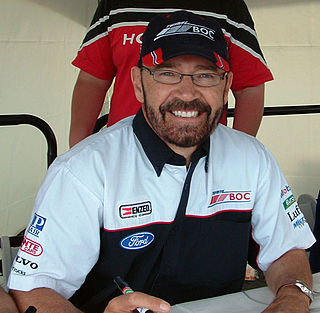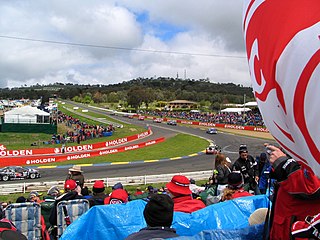
Peter Geoffrey Brock, otherwise known as "Peter Perfect", "The King of the Mountain", or simply "Brocky", was one of Australia's best-known and most successful motor racing drivers. Brock was most often associated with Holden for almost 40 years, although he raced vehicles of other manufacturers including BMW, Ford, Volvo, Porsche and Peugeot. He won the Bathurst 1000 endurance race nine times, the Sandown 500 touring car race nine times, the Australian Touring Car Championship three times, the Bathurst 24 Hour once and was inducted into the V8 Supercars Hall of Fame in 2001. Brock's business activities included the Holden Dealer Team (HDT) that produced Brock's racing machines as well as a number of modified high-performance road versions of his racing cars.

The Australian Grand Prix is a motor race held annually in Australia currently under contract to host Formula One until 2025. The Grand Prix is the second oldest surviving motor racing competition held in Australia, after the Alpine rally first held in 1921, having been contested 83 times since it was first run at Phillip Island in 1928. It is currently sponsored with naming rights by Swiss watchmaker Rolex.

The Cannonball Run is a 1981 action comedy film. Filmed in Panavision, it was directed by Hal Needham, produced by Hong Kong's Golden Harvest films, and distributed by 20th Century Fox. It features an all-star supporting cast, including Burt Reynolds, Roger Moore, Dom DeLuise, Farrah Fawcett, and Jackie Chan. The film is based on the 1979 running of an actual cross-country outlaw road race in the United States, beginning in Connecticut and ending in California.

Street racing is typically an unsanctioned and illegal form of auto racing that occurs on a public road. Racing in the streets is an ancient hazard, as horse racing occurred on streets for centuries, and street racing of automobiles is as old as the automobile itself. It became especially prevalent during the heyday of hot rodding and muscle cars, and it continues to be both popular and hazardous, with deaths and maiming of bystanders, passengers, and drivers occurring every year. In the United States, modern street racing traces its roots back to Woodward Avenue, Michigan in the 1960s when the three main Detroit-based American car companies were producing high-powered performance cars. A private racing venue was not always available, and therefore the race would be held illegally on public roads.
A hoon, in Australia and New Zealand, is a person who deliberately drives a vehicle in a reckless or dangerous manner, generally in order to provoke a reaction from onlookers.

The Gumball Rally is a 1976 American comedy film directed and co-written by Charles Bail, a former stunt coordinator also known as Chuck Bail, about an illicit coast-to-coast road race. It was inspired by the Cannonball Baker Sea-To-Shining-Sea Memorial Trophy Dash run by Brock Yates, which inspired several other films, including Cannonball (1976), Cannonball Run (1981), and Speed Zone (1989), as well as an actual event, the American Gumball Rally and Gumball 3000 international race.
The Cannonball Baker Sea-To-Shining-Sea Memorial Trophy Dash, widely known as the Cannonball Baker or Cannonball Run, was an unofficial, unsanctioned automobile race run five times in the 1970s from New York City and Darien, Connecticut, on the East Coast of the United States to the Portofino Inn in Redondo Beach, California. The Cannonball Run races have additionally inspired numerous contemporary efforts by independent teams to set the record time for the route, known as the Cannonball Run Challenge.
The Australian Touring Car Championship (ATCC) is a touring car racing award held in Australia since 1960. The series itself is no longer contested, but the title lives on, with the winner of the Virgin Australia Supercars Championship awarded the trophy and title of Australian Touring Car Champion.

The Holden Dealer Team (HDT) was Holden's semi-official racing team from 1969 until 1986, primarily contesting Australian Touring Car events but also rallying, rallycross and sports sedans during the 1970s. From 1980 the Holden Dealer Team, by then under the ownership of Peter Brock, diversified into producing modified road-going Commodores and other Holden cars for selected dealers via HDT Special Vehicles.
Allan George MoffatOBE is a Canadian-Australian racing driver known for his four championships in the Australian Touring Car Championship, six wins in the Sandown 500 and his four wins in the Bathurst 500/1000. Moffat was inducted into the V8 Supercars Hall of Fame in 1999.
Robert Frederick Jane was an Australian race car driver and prominent entrepreneur and business tycoon. A four-time winner of the Armstrong 500, the race that became the prestigious Bathurst 1000 and a four-time Australian Touring Car Champion, Jane was well known for his chain of tyre retailers, Bob Jane T-Marts. Jane was inducted into the V8 Supercars Hall of Fame in 2000.

Sandown International Raceway is a motor racing circuit in the suburb of Springvale in Melbourne, Victoria, approximately 25 kilometres (16 mi) south east of the city centre. Sandown is considered a power circuit with its "drag strip" front and back straights being 899 and 910 metres long respectively.

The Holden Commodore (VK) is a mid-size car that was produced by the Australian manufacturer Holden from 1984 to 1986. It was the fourth iteration of the first generation of the Holden Commodore and introduced the luxury variant, Holden Calais (VK) sedan.

John Bowe is an Australian racing driver, presently racing a Holden Torana in the Touring Car Masters series.

A random checkpoint is a military and police tactic. In a military context, checkpoints involve the setup of a hasty roadblock by mobile truck- or armored vehicle-mounted infantry to disrupt unauthorized or unwanted movement or military activity and to check for valid identification and search for contraband, fugitives, or weapons that are not permitted in civilian hands. Random checkpoints are set up to achieve surprise, as opposed to known permanently located checkpoints, which suspects could circumvent. They are often established in locations where they cannot be observed by approaching traffic until it is too late to withdraw and escape without being observed.

Allan Maxwell Grice, known to motor-racing fans as "Gricey", is an Australian former racing driver and politician, most famous for twice winning the prestigious Bathurst 1000, and as a privateer driver of a Holden in the Australian Touring Car Championship.

Motorsport is a popular spectator sport in Australia, although there are relatively few competitors compared to other sports due to the high costs of competing. The oldest motorsport competition in Australia is the Alpine Rally which was first staged in 1921 followed by the Australian Grand Prix, first staged in 1928. The most widely watched motorsport category is Supercars, especially at the Bathurst 1000. Other classes in Australia include Australian GT, Formula 3 and Formula Ford, Superbikes, as well as various forms of speedway racing.
John Francis Harvey is a retired Australian racing driver. He was a top Speedcar driver for many years in the 1950s and 1960s, winning many championship races including the NSW Championship for three successive years and the Victorian Championship twice before turning his skills to road racing where he had a long and successful career until his retirement at the end of 1988.
George Fury is a retired Australian rally and racing car driver. For the majority of his career Fury was associated with Nissan, twice winning the Australian Rally Championship, and twice runner up in the Australian Touring Car Championship. Fury, a farmer living and working in the New South Wales country town of Talmalmo, was nicknamed "Farmer George" or "The Talmalmo Farmer".
The Modball Rally is an international driving tour with a different route each year. Founded in 2007 it sees an entry of around 100-180 cars per event which are mostly modified supercars. However, modified cars do not stop at sports cars and the rally has resulted in entries including fire engines, Ferraris, Limousines and everything else you can imagine. The Rally is not a race nor a rally in the traditional sense such as the WRC; there is no prize for being fastest nor official timekeeping of any sort. Organizers emphasize that it is a road trip adventure and not a race.











